Middle East
Month of giving: Syrians in Ethiopia keep Ramadan iftar tradition alive | Religion

Addis Ababa, Ethiopia – Images of old Damascus and Aleppo adorn the walls of a modest restaurant tucked into Bole Michael, a working-class neighbourhood near Addis Ababa’s international airport.
Chatter in Arabic and Amharic fills the air, mingling with the sizzling of a grill roasting a giant shawarma skewer and oil crackling around crunchy kebeiba (bulgur and ground meat balls).
In the kitchen, Syrian chef Ahmed Ibrahim and his two assistants prepare for the evening rush. As the sun begins its descent, they carefully fill small bowls with hummus and dates for guests in the restaurant and pack takeaway meals for those who stop by seeking a free meal.
In the spirit of the Muslim holy month of Ramadan, Ibrahim says he is happy to give back.
“When I first came to Ethiopia in 2020, I didn’t have a penny to my name. I worked in restaurants until I could open my own. I married an Ethiopian woman, and now, I’m a father of two daughters,” Ibrahim tells Al Jazeera. “This country has become a home to me.”
More than 5.5 million Syrians have fled their homeland since 2011, when war broke out after the government cracked down on a popular uprising. Most Syrians who left sought refuge in neighbouring countries like Lebanon, Turkiye, and Egypt.

But some ventured further, to countries like Ethiopia, where fewer than 1,500 Syrians reportedly live.
Al Jazeera approached Ethiopia’s Immigration and Citizenship Services for an official estimate, but the agency declined to respond. According to local media, many Syrians remain unregistered and live in limbo.
Despite these challenges, Bole Michael has become known as a Syrian neighbourhood. More Syrian refugees have found their way there, carving out a familiar rhythm.
Its streets, largely unpaved and strewn with pebbles and dust, have long been home to Somali, Sudanese and Yemeni refugees – some of the more than one million refugees living in Ethiopia.
In recent years, Syrian businesses have started adding their accents and flavours to the bustling area.
Ibrahim’s restaurant, named Syria, is one such business. The 34-year-old arrived in Ethiopia five years ago after a three-year stay in Sudan was cut short by political unrest there. Opening the restaurant, he says, was a way to recreate a slice of home in exile, a place where he could serve the dishes of his homeland to those who would appreciate them.
During Ramadan, that mission takes on even greater meaning: giving.
![Salem Berhanu, a regular at Syrian restaurants in Bole Michael, enjoying dinner with Syrians [Samuel Getachew/Al Jazeera]](https://www.aljazeera.com/wp-content/uploads/2025/03/Salem-Berhanu-a-regular-in-the-Syrian-neighbourood-enjoying-dinner-with-Syrians.-Image-by-Samuel-Getachew-1743093683-e1743273669719.jpg?w=770&resize=770%2C521)
“It would’ve been great if I could host a free iftar for everyone in need, like the ones I grew up seeing in Syria,” says Ibrahim, referring to a centuries-old tradition across the Middle East, where banquets are set up on the streets to offer free food to passersby breaking their Ramadan fast at sunset.
“But that would be difficult here, since poverty is widespread and we’re just a small business,” he adds.
“Instead, during Ramadan, we try not to turn anyone away,” he says, explaining that the restaurant serves free meals to those in need during the holy month. “It’s about community and helping however you can,” he says.
Nearly a quarter of Ethiopia’s 124 million people live below the poverty line.
A taste of generosity from home
As the adhan echoes from a nearby mosque, signalling the end of the fast, Ibrahim begins welcoming diners.
Among them is Zeynab Mohammed, a Syrian mother of four who arrived in Ethiopia last year after fleeing Khartoum amid Sudan’s continuing civil war. Since settling in Addis Ababa, she has tried to make a living selling homemade perfume on the streets.
Closing her eyes briefly in prayer, she digs into a fragrant chicken shawarma wrap with fries.

“Life here isn’t easy,” Zeynab says quietly. “But moments like this remind me of home. The generosity, the shared meals – it’s something we carried with us from Syria, and it’s still alive here.”
Sitting next to her is Salem Berhanu, an Ethiopian friend and familiar face in the neighbourhood. Berhanu often joins newcomers at local eateries, occasionally paying for their food when he can. He is well-known among local children who gather around him, chatting in Amharic.
Berhanu says he enjoys seeing Syrians in Ethiopia. “It’s beautiful, especially during Ramadan, because it gives us a chance to meet new people and have meaningful conversations,” he says.
While many Syrians say they’ve felt welcome in Ethiopia, the challenges remain immense.
At a nearby table, another Syrian refugee, Aisha Abdul, recalls her early years in the country. She arrived in Addis Ababa after a perilous bus journey from Sudan, during which she hid from fighters who sometimes attacked convoys.
Three years ago, she and other worshippers at a local mosque in Bole Michael were invited to an iftar hosted by Ethiopian Prime Minister Abiy Ahmed – a moment that, for her, felt like a lifeline after years of displacement.
Now, she sells scented charcoal alongside other Syrian refugees, often at traffic stops and crowded gathering spots.

On an average day, she says, she makes about $5, though on good days, she earns more with the help of her children.
“Ethiopia is a very welcoming country, and the people are wonderful. But it can also feel like a dead end,” she says. “There’s no assistance, and finding a job is difficult, so many of us end up doing humiliating work just to survive.”
Gratitude in a new land
In Bethel, a calmer, more affluent neighbourhood on Addis Ababa’s western outskirts, an inflated air dancer bearing a trademark thick mustache and red fez signals that Syriana, another popular Syrian restaurant, is open.
Inside, trays of crunchy, cream-filled kunafa and syrup-drenched baklava are on display, and as Eid al-Fitr approaches to mark the end of Ramadan, biscuits and cookies traditionally baked for the occasion have been added, keeping long-held Syrian customs alive.
Ethiopian patrons, mostly young people, gather at round tables. Many were drawn there by the TikTok channel of 21-year-old owner Ahmed Abdulkader, who has turned his family’s business into a sought-after venue.
During Ramadan, however, Syriana also welcomes less fortunate visitors.

“We donate all we can, including meals throughout Ramadan for anyone in need,” Abdulkader tells Al Jazeera, explaining that they rely on word of mouth to identify those who might need help. “We try to be good citizens and help however we can,” he adds.
While thousands of Syrian refugees worldwide have returned home with the fall of former President Bashar al-Assad’s regime on December 8, Abdulkader – like Ibrahim – has come to think of Ethiopia as home.
Fluent in Amharic, Abdulkader came to Ethiopia at the age of eight, soon after the war in Syria began. He attended school in Ethiopia, learned the language, and adapted to his adopted country. Thanks to his social media presence, he has become something of a household name, and his family is even considering expanding to other parts of Addis Ababa.
While Syrians have become renowned for their contributions to the culinary scenes in Egypt, Libya, Jordan, and elsewhere, those who settled in Ethiopia had to overcome language barriers and unfamiliar local tastes.
Grateful for his family’s success, Abdulkader says this month offers him a chance to reflect and give back.
“Ramadan allows me to connect with my customers on a personal level and offer food to anyone, regardless of their ability to pay,” he says.
This piece was published in collaboration with Egab.
Middle East
Hamas says ceasefire proposal offers ‘no guarantees’ for end to Gaza war | Israel-Palestine conflict News
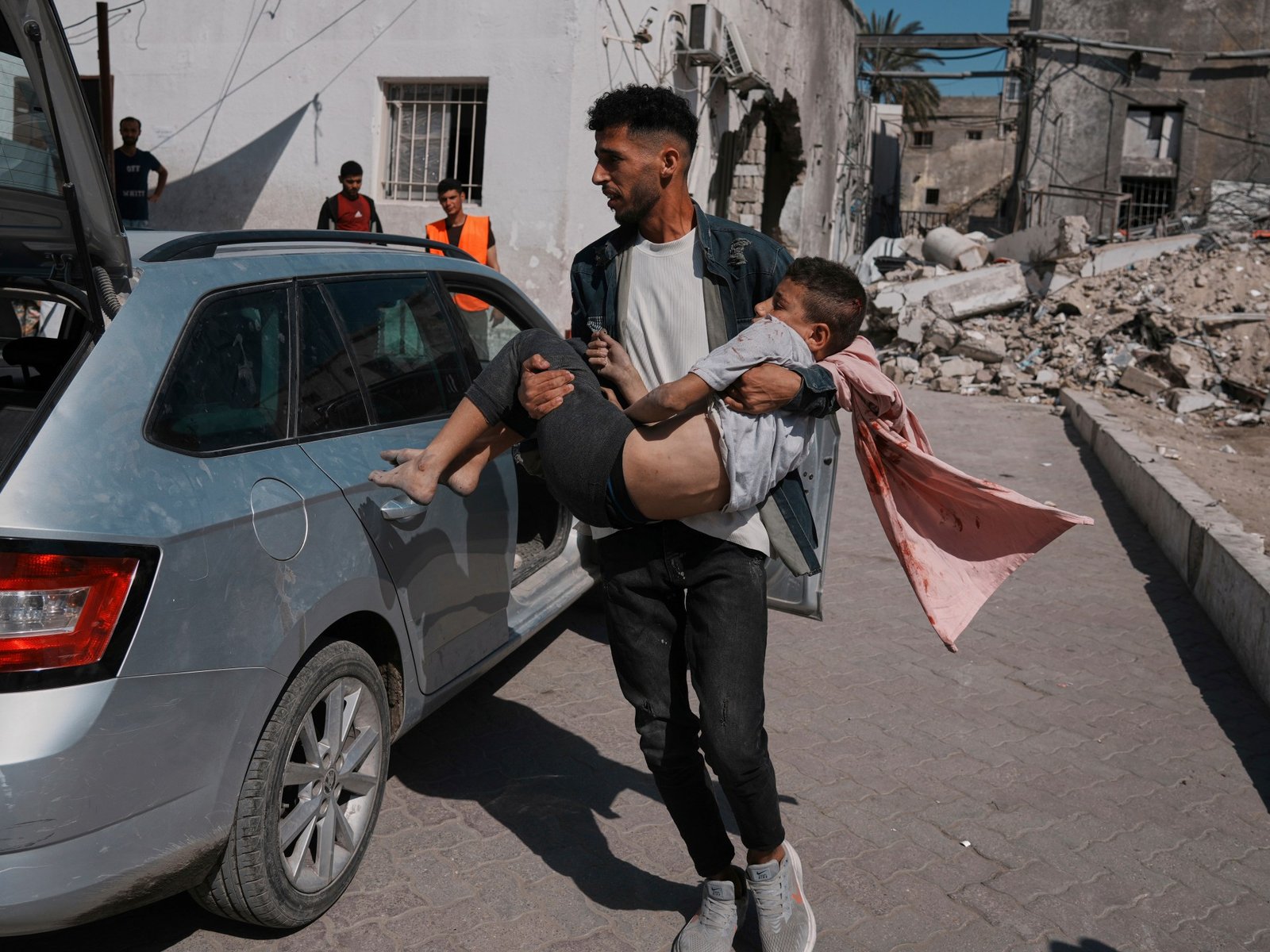
The Palestinian group Hamas has submitted its response to a United States-backed ceasefire proposal, but a leading official from the group said the proposed deal offered “no guarantees to end the war”.
Speaking to Al Jazeera on Saturday, Basem Naim said that Hamas had still “responded positively” to the latest proposal relayed to it by US special envoy Steve Witkoff, despite the Palestinian group saying that the proposal was different to one it had agreed upon with Witkoff a week earlier.
“One week ago, we agreed with Mr Witkoff on one proposal, and we said, ‘This is acceptable, we can consider this a negotiating paper,’” Naim said. “He went to the other party, to the Israelis, to get their response. Instead of having a response to our proposal, he brought us a new proposal … which had nothing to do with what we agreed upon.”
In a statement released earlier on Saturday, Hamas had said that it had submitted a response to Witkoff, and that the proposal “aims to achieve a permanent ceasefire, a comprehensive withdrawal from the Gaza Strip, and ensure the flow of aid” to Palestinians in Gaza.
Hamas added that 10 living Israeli captives would be released as part of the agreement, as well as the bodies of 18 dead Israelis, in exchange for an “agreed-upon number of Palestinian prisoners”.
Witkoff called Hamas’s response “totally unacceptable”.
“Hamas should accept the framework proposal we put forward as the basis for proximity talks, which we can begin immediately this coming week,” the envoy said in a post on social media. “That is the only way we can close a 60-day ceasefire deal in the coming days in which half of the living hostages and half of those who are deceased will come home to their families, and in which we can have at the proximity talks substantive negotiations in good-faith to try to reach a permanent ceasefire.”
Israeli Prime Minister Benjamin Netanyahu slammed Hamas’s response, “As Witkoff said, Hamas’s response is unacceptable and sets the situation back. Israel will continue its action for the return of our hostages and the defeat of Hamas.”
Israel has now killed more than 54,000 Palestinians since October 2023, with starvation looming across Gaza after weeks of Israeli blockade, and only a small flow of aid since Israel allowed it to resume in mid-May.
Starvation
With hopes for a permanent truce seemingly fading once again, the level of hunger and desperation inside Gaza grows, with Israel allowing only a trickle of humanitarian aid into the Strip after it had imposed a total blockade for more than two months. The UN warned on Friday that all of the 2.3 million population of Gaza is now at risk of famine. That came after it said in mid-May that one in every five Palestinians there is experiencing starvation.
The World Food Programme (WFP), which has enough food ready near Gaza’s borders to feed the besieged territory’s entire population for two months, renewed its call for an immediate ceasefire as the only way to get the food to starving Palestinians.
The UN’s food agency said in a statement that it brought 77 trucks loaded with flour into Gaza overnight and early on Friday, but they were stopped by people trying to feed their starving families.
The US- and Israeli-backed Gaza Humanitarian Foundation (GHF) is continuing with its own controversial aid distribution, which other aid groups say could violate humanitarian principles and militarise the delivery of desperately needed food. The Gaza Government Media Office said this week that at least 10 Palestinians had been killed by Israeli forces while trying to get aid.
“We went to this new area and we came out empty-handed,” resident Layla al-Masri said of a new GHF distribution point. “What they are saying about their will to feed the people of Gaza are lies. They neither feed people nor give them anything to drink.”
Another displaced Palestinian, Abdel Qader Rabie, said people across the besieged territory have nothing left to feed their families. “There’s no flour, no food, no bread. We have nothing at home,” he said.
Rabie said that every time he tries to get a box of aid at the GHF, he is swarmed by hundreds of other people trying to get it. “If you are strong, you get aid. If you are not, you leave empty-handed,” Rabie added.
There are also other risks. Families have reported that people have gone missing after reaching GHF distribution points.
“One of these cases is a man from the al-Mughari family – The family is appealing to the ICRC, OCHA, the civil defence teams, to go and search for him in that area – very close to the Netzarim Corridor [in central Gaza],” said Hind Khoudary, reporting from Deir el-Balah, central Gaza. Israeli authorities rejected the accusation, Khoudary added.
Bombing and forced displacement
The Israeli army is continuing its attacks on Gaza, with the spokesperson of the territory’s civil defence saying that approximately 60 homes had been bombed in the last 48 hours in Gaza City and northern Gaza.
On Saturday, there were also reports from across Gaza of the Israeli bombing killing at least 20 Palestinians. More than 3,900 Palestinians have been killed since Israel unilaterally broke a ceasefire in March and resumed its devastation of Gaza, despite growing international condemnation.
Since Friday’s early hours, the Israeli army has also ordered “all residents” of southern Khan Younis, Bani Suheila, and Abasan to evacuate immediately after it said rockets were earlier fired. “The [army] will aggressively attack any area used as a launching pad for terrorist activity,” military spokesperson Avichay Adraee said in a statement. The area of southern Gaza “has been warned several times in the past and has been designated a dangerous combat zone”, he added.
According to the UN, nearly 200,000 people have been displaced in the past two weeks alone, with displacement orders now covering the entirety of Gaza’s northernmost and southernmost governorates, as well as the eastern parts of each of the three governorates in between.
Middle East
Saudi Arabia says it will jointly fund Syria state salaries with Qatar | Syria’s War News
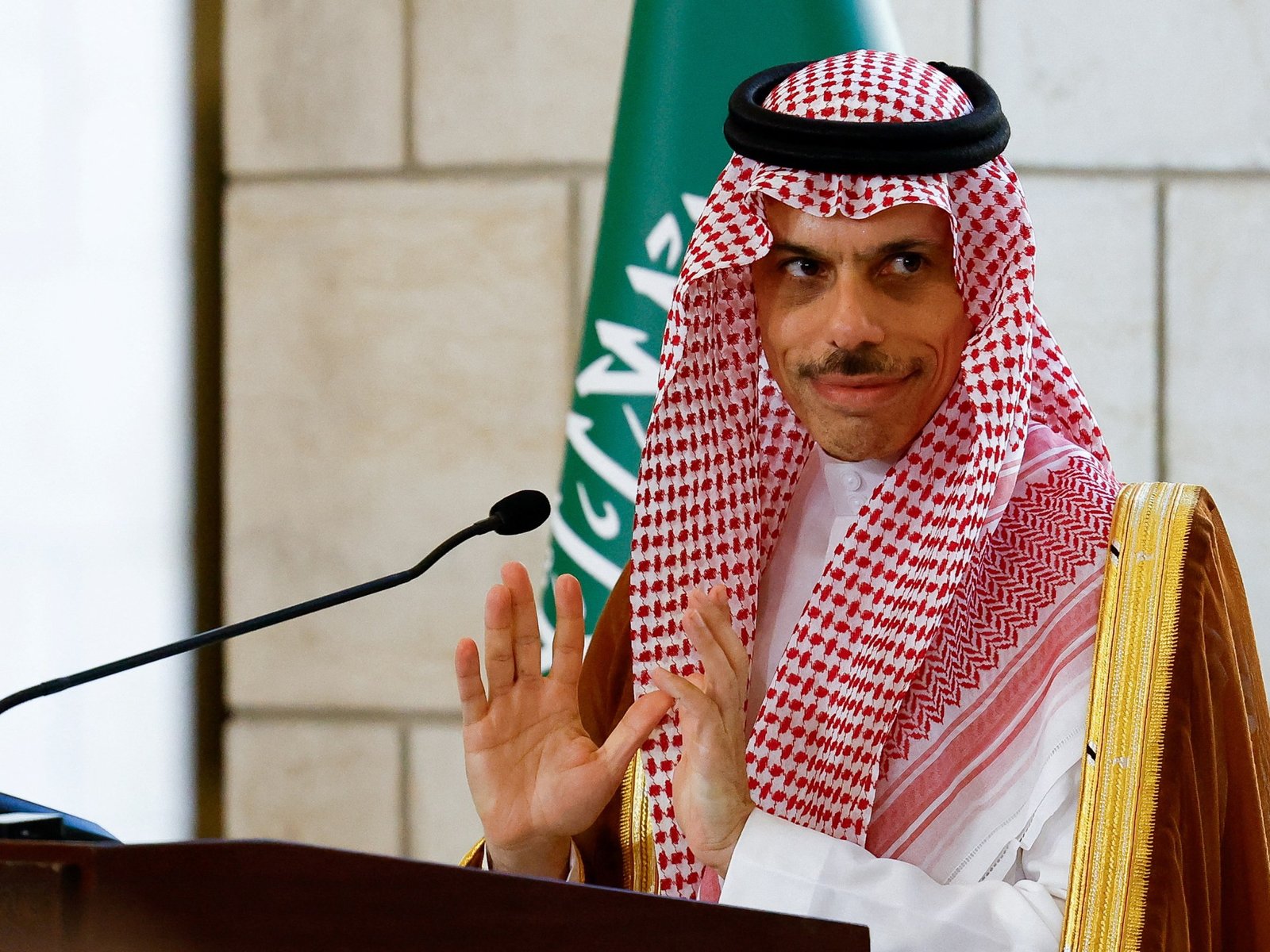
Saudi and Qatari efforts aim to stabilise Syria by funding public-sector salaries and boosting economic recovery plans.
Saudi Arabia’s Foreign Minister Prince Faisal bin Farhan Al Saud has said that the kingdom and Qatar will offer joint financial support to state employees in Syria.
His statements came on Saturday during a joint press conference with his Syrian counterpart Asaad al-Shibani in Damascus.
The two Gulf nations have been among the most important regional supporters of Syria’s new authorities, who ousted longtime ruler Bashar al-Assad in December after nearly 14 years of war.
Saturday’s statement did not provide details on the exact amount of the support for Syria’s public sector. However, it comes after Syrian Finance Minister Mohammed Yosr Bernieh said earlier in May that Qatar was going to provide Syria with $29m per month for an initial three months to pay civilian public sector worker salaries.
The Reuters news agency had also reported that the United States had given its blessing to the Qatari initiative, which came a few days before President Donald Trump announced that sanctions on Syria imposed during the al-Assad regime would be lifted. The European Union has since also lifted sanctions on Syria.
Further evidence of Saudi Arabian and Qatari support came in mid-May, when it was announced that the two countries had paid off Syria’s debt to the World Bank, a sum of roughly $15m.
International ties
Syria’s new government, led by interim President Ahmed al-Sharaa, has sought to rebuild the country’s diplomatic ties and convince wary Western states that he has turned his back on past ties with groups such as al-Qaeda.
The Syrian leader has repeatedly disavowed extremism and expressed support for minorities, but incidents of violence that has led to hundreds of deaths continue to cause international trepidation – even as the government and al-Sharaa denounce the killings.
Syria’s new government has also made a concerted effort to solidify ties to Gulf Arab states who have begun to play a pivotal role in financing the reconstruction of Syria’s war-ravaged infrastructure and reviving its economy.
On Tuesday, the European Union announced it had adopted legal acts lifting all economic restrictive measures on Syria except those based on security grounds. It also removed 24 entities from the EU list of those subject to the freesing of funds and economic resources, including the Central Bank of Syria.
And after Saudi Arabia and Qatar cleared Syria’s debt to the World Bank, the US-based financial institution said that it would restart operations in the country following a 14-year pause.
The World Bank has begun to prepare its first project in Syria, which will focus on improving electricity access – a key pillar for revitalising essential services like healthcare, education, and water supply. It also marked the start of expanded support to stabilise Syria and boost long-term growth.
Syria’s gradual re-integration into the global economy is in large part due to Trump’s dramatic shift in Washington’s policies towards the country. After announcing the lifting of US sanctions on May 13, Trump also became the first US president in 25 years to meet with a Syrian counterpart.
The US had already removed a $10m reward for the capture of al-Sharaa, and the Syrian president has been able to travel internationally and meet world leaders, including in Saudi Arabia and France.
Still, there is a lot to be done. A February report by the United Nations Development Programme (UNDP) estimated that at current growth rates, Syria would need more than 50 years to return to the economic level it had before the war, and it called for massive investment to accelerate the process.
The UNDP study said nine out of 10 Syrians now live in poverty, one-quarter are jobless and Syria’s gross domestic product “has shrunk to less than half of its value” in 2011, the year the war began.
Middle East
Iran increases stockpile of enriched Uranium by 50 percent, IAEA says | Nuclear Weapons News

The UN nuclear watchdog warns Tehran could be close to weapons-grade enriched uranium, as negotiations with the US continue.
The United Nations nuclear watchdog says Iran has increased its stockpile of highly enriched, near weapons-grade uranium by 50 percent in the last three months.
The report by the International Atomic Energy Agency (IAEA) on Saturday comes as nuclear deal negotiations are under way between the United States and Iran, with Tehran insisting its nuclear programme is for peaceful purposes only.
The IAEA said as of May 17, Iran had amassed 408.6kg (900.8 pounds) of uranium enriched up to 60 percent – the only non-nuclear weapon state to do so, according to the UN agency – and had increased its stockpile by almost 50 percent to 133.8kg since its last report in February.
The wide-ranging, confidential report seen by several news agencies said Iran carried out secret nuclear activities with material not declared to the IAEA at three locations that have long been under investigation, calling it a “serious concern” and warning Tehran to change its course.
Iranian Foreign Minister Abbas Araghchi, however, reaffirmed the country’s longstanding position, saying Tehran deems nuclear weapons “unacceptable”.
“If the issue is nuclear weapons, yes, we too consider this type of weapon unacceptable,” Araghchi, Iran’s lead negotiator in the nuclear talks with the US, said in a televised speech. “We agree with them on this issue.”
‘Both sides building leverage’
But the report, which was requested by the IAEA’s 35-nation board of governors in November, will allow for a push by the US, Britain, France and Germany to declare Iran in violation of its non-proliferation obligations.
On Friday, US President Donald Trump said Iran “cannot have a nuclear weapon”.
“They don’t want to be blown up. They would rather make a deal,” Trump said, adding: “That would be a great thing that we could have a deal without bombs being dropped all over the Middle East.”
In 2015, Iran reached a deal with the United Kingdom, US, Germany, France, Russia, China and the European Union, known as the Joint Comprehensive Plan of Action. It involved the lifting of some sanctions on Tehran in return for limits on its nuclear development programme.
But in 2018, then US President Trump unilaterally quit the agreement and reimposed harsh sanctions. Tehran then rebuilt its stockpiles of enriched uranium.
In December last year, the IAEA said Iran was rapidly enriching uranium to 60 percent purity, moving closer to the 90 percent threshold needed for weapons-grade material.
Western nations say such intensive enrichment should not be part of a civilian nuclear programme, but Iran insists it is not developing weapons.
Hamed Mousavi, professor of political science at Tehran University, told Al Jazeera the IAEA findings could indicate a possible negotiation tool for Iran during its ongoing nuclear talks with the US.
“I think both sides are trying to build leverage against the other side. From the Iranian perspective, an advancement in the nuclear programme is going to bring them leverage at the negotiation table with the Americans,” he said.
On the other side, he said, the US could threaten more sanctions and may also refer the Iranian case to the UN Security Council for its breach of the 2006 non-proliferation agreement. However, he added that Iran has not made the “political decision” to build a possible bomb.
“Enriching up to 60 percent [of uranium] – from the Iranian perspective – is a sort of leverage against the Americans to lift sanctions,” Mousavi said.
-

 Africa4 days ago
Africa4 days agoSurvivor of Liverpool car ramming talks of shock and panic
-

 Sports3 days ago
Sports3 days agoThe Knicks are bringing hope and title dreams back to New York after years in the doldrums
-

 Lifestyle3 days ago
Lifestyle3 days agoChildren and careers: Talking to kids about what they want to be when they grow up
-

 Lifestyle4 days ago
Lifestyle4 days agoHow to decorate a patio, balcony or other small outdoor space
-

 Lifestyle4 days ago
Lifestyle4 days agoFaizan Zaki hopes to go from spelling bee runner-up to champ
-
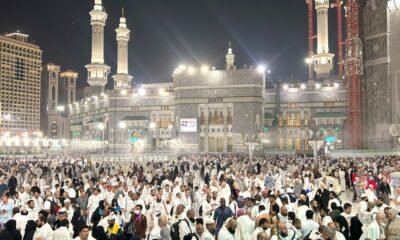
 Middle East5 days ago
Middle East5 days agoHajj pilgrimage in Saudi Arabia to begin on June 4 | Religion News
-
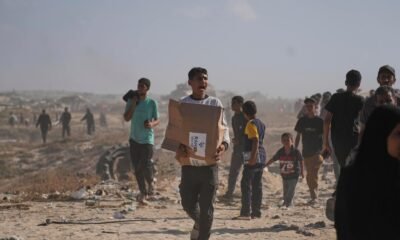
 Middle East4 days ago
Middle East4 days agoGaza’s aid system isn’t broken. It’s working exactly as designed | Humanitarian Crises
-
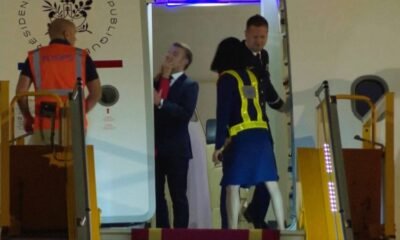
 Europe5 days ago
Europe5 days agoMacron’s marital shove disappears from French airwaves




